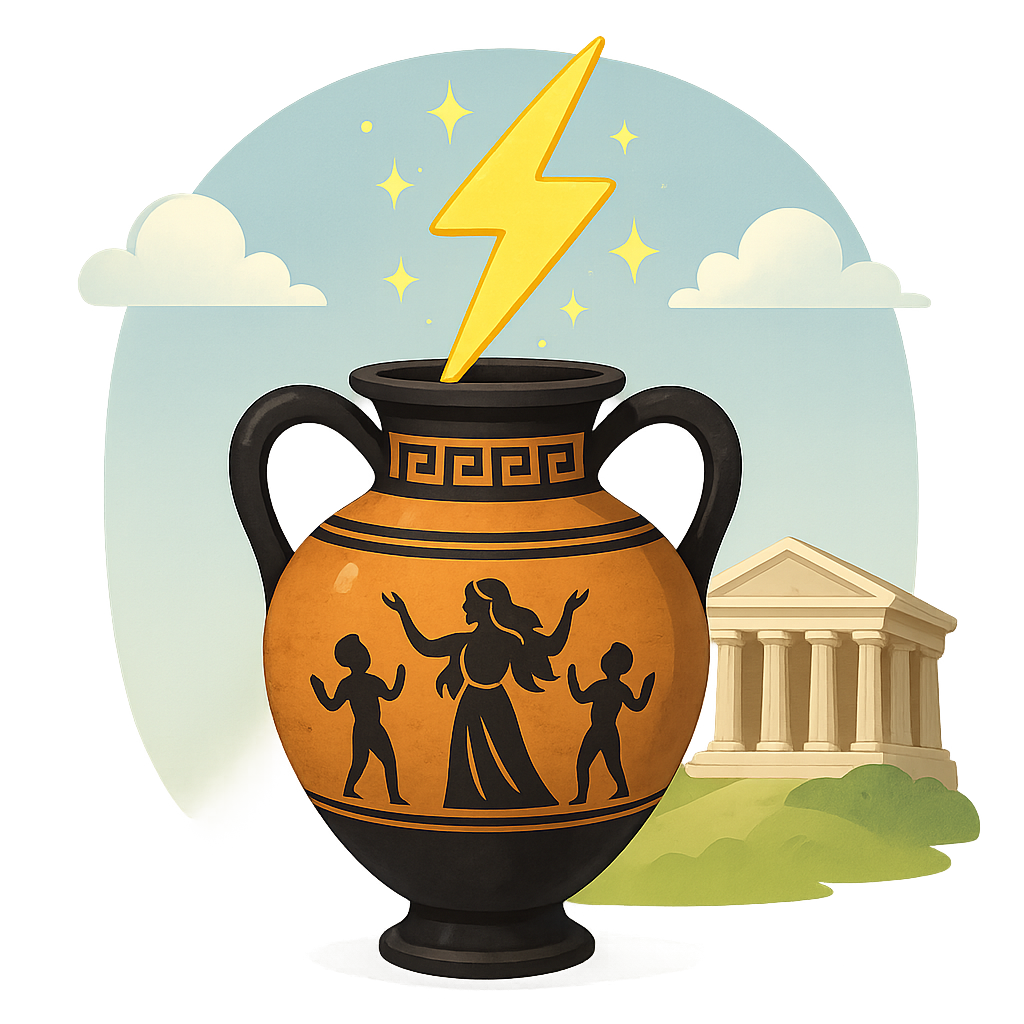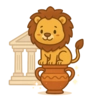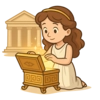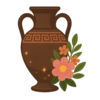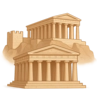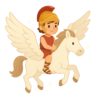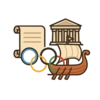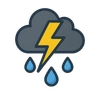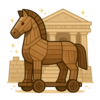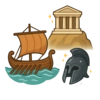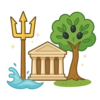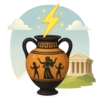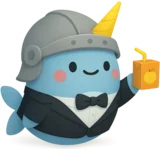Zeus and the Overthrow of the Titans
From my throne atop Mount Olympus, the world unfolds like a map of shimmering seas and emerald lands, all under my watch. Clouds drift below my feet, and the energy of the heavens hums around me, a constant reminder of my power and my duty as king of the gods. But it was not always so. Before my reign, before the gleaming halls of Olympus were ever built, the world trembled under the rule of the mighty but fearful Titans. This is the story of how that age ended, and how ours began; this is the myth of the Titanomachy.
My father, Cronus, was the king of the Titans, and he ruled with an iron fist, largely because he was terrified. A prophecy had been spoken by his own parents, a chilling whisper that foretold his doom: one of his own children would one day usurp his throne, just as he had overthrown his own father before him. This fear became a poison in his mind, twisting him into a tyrant. To prevent the prophecy from ever coming true, he devised a monstrous plan. As each of his children was born to my mother, the gentle Queen Rhea, he would take the infant and imprison them within himself, swallowing them whole. My poor siblings—Hestia, Demeter, Hera, Hades, and Poseidon—never had a chance to see the light of day. My mother watched in silent, heartbreaking anguish as five of her children were stolen from her moments after their birth. Her sorrow turned to resolve. When she learned she was to have a sixth child—me—she vowed that this one would be saved. She fled to the remote island of Crete and gave birth to me in a deep, hidden cave. She then returned to Cronus, her face a mask of grief, and presented him with a large stone, about the size of a newborn, wrapped in soft swaddling clothes. Cronus, blinded by his paranoia, did not even look closely. He seized the bundle and swallowed it whole, believing his reign was once again secure.
My childhood was a secret symphony of nature and vigilance on the island of Crete. I was cared for by gentle nymphs who fed me milk from a sacred goat, and I was guarded by the Kouretes, fierce warriors who would clash their spears against their shields with a thunderous rhythm whenever I cried, drowning out the sound so my father would never hear me. I grew strong, my sinews hardened by the mountain air and my mind sharpened by the whispers of my destiny. When I reached manhood, I knew the time for hiding was over. I sought the counsel of the wise Titaness Metis, whose wisdom was as vast as the ocean. Together, we concocted a potent mixture, a potion designed to undo my father’s terrible crime. Disguised as a humble cupbearer, I traveled to the Titan court on Mount Othrys and served the potion to my unsuspecting father. The effect was immediate and violent. He retched and convulsed, and one by one, my siblings were disgorged, not as infants, but as fully grown, powerful gods and goddesses, furious and ready for justice. There, on the plains below the great mountains, we swore an oath. We would end the tyranny of the Titans. Thus began the Titanomachy, the Great War, a conflict that would rage for ten grueling years. The world shook as we, the new gods, fought from the peak of Mount Olympus, while the Titans defended their reign from Mount Othrys. Mountains were torn from their roots and hurled as weapons, and the sky itself seemed to burn. But raw power was not enough. I knew we needed allies of a different sort. I journeyed to the deepest abyss of the underworld, Tartarus, and there I found them: the Cyclopes, masters of the forge, and the Hecatoncheires, the Hundred-Handed Ones, whose strength was that of an earthquake, all unjustly imprisoned by Cronus. In gratitude for their freedom, the Cyclopes forged for us weapons of unimaginable power. For my brother Poseidon, a trident that could command the seas. For my brother Hades, a helm of darkness that rendered him invisible. And for me, they harnessed the very essence of the storm: the thunderbolt.
With the thunderbolt in my hand, the tide of the war turned decisively. The might of the Hundred-Handed Ones and the fury of my siblings were unstoppable. We cast Cronus and the Titans who fought with him down into the inescapable darkness of Tartarus, their age of fear finally over. When the dust settled, a new order was born. We, the victors, gathered to divide the cosmos. By drawing lots, we sealed our fates. To Hades fell the solemn, shadowy realm of the Underworld. Poseidon claimed the restless, deep blue seas as his dominion. And to me, the youngest, fell the vast expanse of the sky and the throne of Mount Olympus, making me king of all gods and mortals. I tell you this story not as a boast, but as a beginning. For the ancient Greeks, this was the ultimate origin story, explaining the world they saw around them—the storms in the sky, the quakes of the sea, the mystery of the afterlife. Our tale did not end there; it echoed through the ages. It was carved into stone, painted onto pottery, and sung by poets like Homer in his epic, 'The Iliad,' around the 8th century BCE. Even now, thousands of years later, our struggles and triumphs inspire stories you see in books and movies. The myth of our victory is a timeless reminder of courage, of the struggle for justice, and of the powerful idea that every generation has the chance to challenge the old ways and build a better, brighter world.
Activities
Take a Quiz
Test what you learned with a fun quiz!
Get creative with colors!
Print a coloring book page of this topic.

